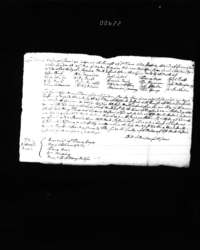How the lives of Georgian gaolbirds and highwaymen shaped modern Britain
Writing historical fiction requires solid research of available materials and databases. The key word here is available.
So news of a new publicly accessible database that allows an author to research a very interesting past era is priceless almost beyond words.
I expect some exciting fiction to come out of this announcement.
Here's the story, with a link to the source in the attribution.
* * * * *
London Lives, a landmark project led by Professor Bob Shoemaker from the University of Sheffield and Professor Tim Hitchcock from the University of Sussex, has uncovered a mass of extraordinary new evidence which reveals how the lives of thousands of 18th-century poor and criminal Londoners helped shape modern Britain.
Based on evidence made available in a publicly available database, the study sheds new light on the everyday lives of thieves, prostitutes, vagrants, highwaymen, con-men, paupers and jailbirds, revealing how their daily fight for survival led to the making of modern Britain.
 |
The story of "Mary Ellenor,
1684-1708,
Servant and
Murderer of her Bastard Child"
from the London Lives archive.
|
The evidence shows that paupers used their limited written and oral skills to cajole and embarrass parish elites, leading to the creation of a more comprehensive welfare system. Meanwhile the courtroom strategies of street robbers laid the foundations for the rise of the adversarial trial -- a legal system used by common law countries such as the UK and US which allows legal representation to both parties.
Criminals who illustrated the failure of justice through constant escapes and charismatic leadership forced the state to build a new world of prisons but also gave hope to some in the wider working classes, according to the historians.
Professor Bob Shoemaker from the University of Sheffield's Department of History, said: "The London Lives project has uncovered a fascinating new insight into lives and experiences of hundreds of thousands of Londoners in the 18th century. They found themselves submerged in poverty or prosecuted for crime but the way they responded forced the authorities to fundamentally transform social policy and the criminal justice system.
"The study shows that celebrity highwaymen, prison escapees, expert manipulators of the poor relief system, lone mothers and vagrants played the system to the best of their ability in order to survive. In their acts of desperation, the poor and criminal exercised a profound and effective form of agency that changed the system itself."
Co-author Tim Hitchcock from the University of Sussex said: "We began by digitizing the records of the Old Bailey, London's central criminal court, and the records of poor relief and other criminal courts held at London's Metropolitan Archives. We then created a website which allowed us to chart the experiences of everyday Londoners who found themselves submerged in poverty or prosecuted for crime.
"What we uncovered was extraordinary: thieves, paupers, prostitutes and celebrity highwaymen, who, again and again, through their cunning, courage, and resourcefulness, forced the pace of change in the evolution of the criminal justice system and the system of poor relief."
The database assembled in order to conduct the study can be accessed online in a database created by Sheffield's Humanities Research Institute. It is available via http://www.londonlives.org.
Link: London Lives
Story Source: Materials provided by University of Sheffield. "Georgian jailbirds and celebrity highwaymen shaped modern Britain." ScienceDaily, 29 January 2016.
Comments
Post a Comment